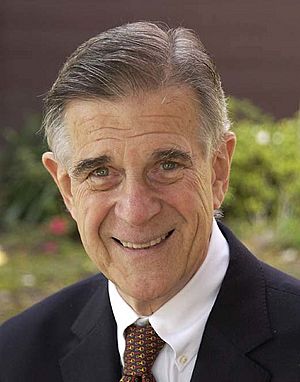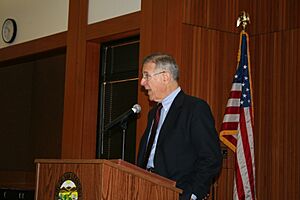Pete Stark facts for kids
Quick facts for kids
Pete Stark
|
|
|---|---|
 |
|
| Member of the U.S. House of Representatives from California |
|
| In office January 3, 1973 – January 3, 2013 |
|
| Preceded by | George P. Miller |
| Succeeded by | Eric Swalwell (redistricting) |
| Constituency | 8th district (1973–1975) 9th district (1975–1993) 13th district (1993–2013) |
| Personal details | |
| Born |
Fortney Hillman Stark Jr.
November 11, 1931 Milwaukee, Wisconsin, U.S. |
| Died | January 24, 2020 (aged 88) Harwood, Maryland, U.S. |
| Political party | Democratic |
| Spouses |
|
| Children | 7 |
| Alma mater | Massachusetts Institute of Technology (BS) University of California, Berkeley (MBA) |
| Occupation |
|
| Military service | |
| Allegiance | |
| Branch/service | |
| Years of service | 1955–1957 |
Fortney Hillman Stark Jr. (born November 11, 1931 – died January 24, 2020), known as Pete Stark, was an American businessman and politician. He served in the United States House of Representatives for 40 years, from 1973 to 2013.
As a Democrat from California, Stark represented different areas over time. His last district, the 13th, covered parts of Alameda County. This included cities like Alameda, Union City, Hayward, and Fremont. When he left office in 2013, he was one of the longest-serving members of Congress. He was also the only openly atheist member of Congress at that time.
After new district maps were drawn in 2010, Stark's district became the 15th for the 2012 election. He lost his re-election bid to fellow Democrat Eric Swalwell. This made him one of the few long-serving Congressmen to lose a general election.
Contents
Early Life and Career
Pete Stark was born in Milwaukee, Wisconsin, on November 11, 1931. His parents were Dorothy M. and Fortney Hillman Stark. His family had German and Swiss roots.
Education and Military Service
Stark studied engineering at the Massachusetts Institute of Technology (MIT). He earned a Bachelor of Science degree in 1953. After college, he served in the United States Air Force from 1955 to 1957. Later, he went to the University of California, Berkeley, where he earned his Master of Business Administration (MBA) in 1960.
Banking Career
In 1963, Stark started his own business, Security National Bank, in Walnut Creek. He wanted it to be "a bank whose sole purpose was to fulfill the financial needs of working people." His bank was one of the first to offer free checking accounts.
Stark grew up as a Republican. However, he changed to the Democratic Party in the mid-1960s because he was against the Vietnam War. He even put peace signs on his bank's checks and a huge peace sign on the bank's roof. In 1972, he sold his share in the bank to run for Congress.
U.S. House of Representatives
Pete Stark served in the U.S. House of Representatives for 40 years. He was known for his strong opinions and focus on certain issues.
Elections to Congress
In 1972, when he was 41, Stark decided to run for Congress. He challenged the 14-term incumbent, George Paul Miller, in the Democratic primary. Stark won the primary election with 56% of the votes. In the main election, he defeated the Republican candidate. After that, he was re-elected 18 times without facing a close challenge until 2012.
In 2012, his district was renumbered as the 15th district. California had a new primary system where the top two vote-getters, regardless of party, moved to the general election. Stark faced Eric Swalwell, a fellow Democrat who was much younger. Swalwell defeated Stark in the general election with 52% of the vote.
Time in Office
Pete Stark was the longest-serving member of Congress from California. He served continuously from January 3, 1973, to January 3, 2013. His official papers from his time in Congress are kept at the Hayward Area Historical Society.
Views on Money and Taxes
Stark often voted against spending bills that he thought were too expensive. For example, he voted against the Food, Conservation, and Energy Act of 2008 because of its high cost.
He also voted against the Emergency Economic Stabilization Act of 2008. This law created the Troubled Asset Relief Program (TARP), which helped banks during a financial crisis. Stark believed it rewarded the banks that caused the problems.
Stark supported a small tax on financial trades, like buying and selling stocks. He proposed a bill in 2010 called the "Investing in Our Future Act." This bill suggested using the money from this tax to help with climate change adaptation, child care, and fighting diseases like HIV/AIDS and malaria.
Focus on Health Care
Health care was a very important topic for Pete Stark. He was often critical of the health insurance system in the United States.
- COBRA Law: In 1985, he helped add an amendment to a budget bill. This amendment became part of the Consolidated Omnibus Budget Reconciliation Act of 1985 (COBRA). COBRA allows many people to keep their health insurance after leaving a job or other life changes. Millions of Americans have used this law.
- Emergency Care: In 1986, he helped pass the Emergency Medical Treatment and Active Labor Act. This law requires hospitals to treat people in their emergency rooms for emergencies, no matter if they have insurance or can pay.
- Stark Law: He introduced a bill in 1988 about doctors referring patients to labs or services where the doctor or their family has a financial interest. This became known as "Stark I" and "Stark II." These laws prevent doctors from making referrals that could be influenced by money, especially for Medicare and Medicaid patients.
Stark worked with other politicians to improve health care. He supported ideas that are now part of the Affordable Care Act. These ideas include making sure all Americans have good health insurance and providing government help for those who can't afford it.
Views on the Iraq War

Pete Stark was one of the first politicians to speak out against the Iraq War. He gave a speech against the war in October 2002.
In 2003, he even supported bringing back the military draft. He said that if the country was going to go to war, it shouldn't just be poor people and minorities who fight. He did not vote to continue funding the Iraq War.
Openly Atheist Member
Pete Stark was the first openly atheist member of Congress. He publicly shared his beliefs in 2007.
In 2008, the American Humanist Association named him "Humanist of the Year." He also helped introduce a bill in 2011 to make February 12th "Darwin Day." This day celebrates Charles Darwin and scientific progress. In 2011, he and eight other lawmakers voted against the national motto, "In God We Trust."
Committee Roles
During his time in Congress, Pete Stark was a key member of important committees:
- Committee on Ways and Means
- Subcommittee on Health (He was the top Democrat on this subcommittee)
- Subcommittee on Income Security and Family Support
He was also part of several groups called caucuses:
- Congressional Progressive Caucus
- Congressional Asian Pacific American Caucus (Associate Member)
- International Conservation Caucus
Death
Pete Stark passed away at his home in Harwood, Maryland, on January 24, 2020. He was 88 years old and died from leukemia.
Images for kids
-
Pete Stark speaks at a Town Hall meeting in January 2007 in San Leandro, California.
See also
 In Spanish: Pete Stark para niños
In Spanish: Pete Stark para niños
 | Kyle Baker |
 | Joseph Yoakum |
 | Laura Wheeler Waring |
 | Henry Ossawa Tanner |


